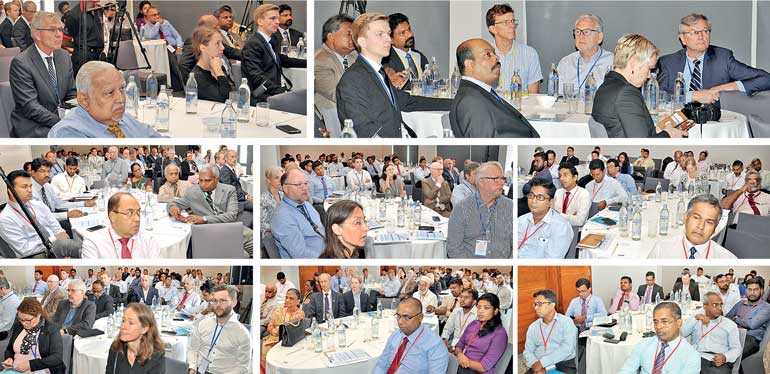Sunday Feb 22, 2026
Sunday Feb 22, 2026
Tuesday, 15 May 2018 00:00 - - {{hitsCtrl.values.hits}}



From left: Chief Guest State Minister of Finance Eran Wickramaratne, Western Norway University of Applied Sciences (HVL) Rector Berit Rokne, Norway
Ambassador Thorbjorn Gaustadsaether, Jaffna University Vice Chancellor Prof. Wigneswaran and Sri Lanka Energy Managers Association
President Ronald Comester – Pix by Ruwan Walpola
By Shannon Jayawardena
Sri Lanka has an absolute need to concentrate on clean energy technology as it is crucial for the overall development of the country, highlighted the recently held clean energy seminar while focusing on solar PV, wind, hydrogen and fuel cells as vital components.
The event was organised by the Western Norway University of Applied Sciences, the Norwegian Embassy and the Sri Lanka Energy Managers Association as an establishment of Norway and Sri Lanka research consortium on clean energy technologies.
Ambassador of Norway Thorbjorn Gaustadsaether said: “Introducing more renewables is necessary to make countries healthier and wealthier and to have clean technologies, significant investments have to be made. The private sector can and are willing to play a key role in this, whereby Sri Lanka already has the resources. It is time to move towards clean energy.”
Clean technology includes a broad range of technology related to recycling, renewable energy such as wind power, solar power, biomass, hydropower, biofuels, information technology, green transportation, electric motors, green chemistry, lighting, grey water and so forth.
Sri Lanka Energy Managers Association President Ronald Comester noted: “We ultimately need a sustainable development and economy, environment and society must be looked into in order to receive sustainable development. Clean energy technology will play a vital role in this regard. In Sri Lanka however there are limitations that are present such as power quality and economic vulnerability.”
He stressed on the fact that remedies have been perceived. Private sector participation and collaboration with research institutions will give positive results for both the private sector and the research institutions.
Western Norway University of Applied Sciences Project Coordinator Dhayalan Velauthapillai stated: “As you know we are at a turning point where clean energy is concerned. There is an absolute need for us to concentrate on clean energy. One of the challenges is educating people, quality workforce, civil awareness and it also has to be affordable to everyone.”
The event also noted that clean technologies are competitive with, if not superior to, their conventional counterparts. Many also offer significant additional benefits, notably their ability to improve the lives of those in both developed and developing countries.
Dr. Tilak Siyambalapitiya stated: “Sri Lanka started off with a small power producer program entirely private sector driven and now has been modified so that small hydro, biomass and waste to energy projects remain in progress.”
Siyambalapitiya added that Sri Lanka is one of the first few countries that standardised the tariff on a same price and contract to everybody which finally resulted in both medium and small scale investors building almost 560 megawatt of a small hydro wind solar PV facility. This enabled the country to meet the target of 10% of renewable energy in 2015.
Western Norway University of Applied Sciences Rector Berit Rokne said: “Energy is central to nearly every major opportunity that the world faces today, be it for jobs, security, food production or increasing incomes. Clean energy is essential to maintain and increase people’s quality of life. Sustainable energy transforms lives and economies. To succeed with clean innovative energy it is important that the private sector and research institutions work together.”